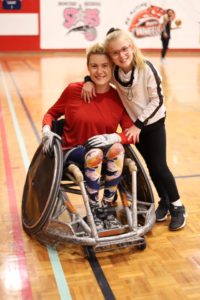By Robyn Lambird
As I’m sure you are aware, growing up with a disability has its challenges. Disabled individuals often face discrimination in education, and the accessibility of the wider community is still a large issue no matter where you live. But for me, by far the biggest challenge when I was younger was isolation.
I have an amazing family, and all throughout my life I’ve had groups of close knit friends that have made me feel immensely loved and valued. But growing up, I really lacked someone with whom I could share my experiences of disability. I don’t just mean talking about them, or looking for solutions to inaccessibility – I mean really delving deep, or as deep as a kid can get, and getting into the nitty gritty of it all with someone who had the personal experience to truly understand mine.
I also didn’t have many role models paving the way for a kid like me. I don’t ever remember seeing a body like mine, with atrophied muscles, who had a limp or a wheelchair, in television or film. I didn’t see my disabled self reflected anywhere outside of a medical environment. And as a kid you don’t know why this is the case, you don’t know disability isn’t seen as marketable, you don’t know that the media is only interested in disability narratives heavy in tired troupes – hell I don’t even think you can grasp the importance of the concept of representation! You just know that you’re different and that there are things about you that other people don’t understand, and things that maybe even you don’t understand.
Today I consider myself very lucky and my life is rich with a sense of community. I have found my people; bloggers who put into words so eloquently the experiences we share, performers and writers making sure our stories are told authentically, innovators who are working to make our lives easier, campaigners putting our struggles into the public eye, and most importantly friends who I don’t have to explain myself to, who have been there and done that.
I also didn’t have many role models paving the way for a kid like me. I don’t ever remember seeing a body like mine, with atrophied muscles, who had a limp or a wheelchair, in television or film. I didn’t see my disabled self reflected anywhere outside of a medical environment.
This community has helped me in so many ways; it has allowed me to explore my identity and find my place in the world as a disabled individual, but I still can’t help thinking that perhaps there still isn’t much there for my younger self – the Robyn who wasn’t quite old enough to figure out the maze of social media, who didn’t know how to network, who just knew what she saw in her school, in her family, and in the media she consumed.
That’s why mentoring is so important to me. I think the earlier we can show people that they are not alone in their disability and that there is difference everywhere in the world, the more likely we are to see people with disabilities thrive. With an increase of visibility, in including disabled people in our media, the more understanding our society will become.
That’s why I put myself out there, both online and in my local community. It’s why I reach out to young disabled folks. Mentoring gives me the opportunity to give back to my community and allows me to provide the special friendship I never had when I was younger – but that I am so grateful to have now. Not only that, I also get to see these wonderful young people develop into fantastic individuals; I get to see them challenging negative stereotypes of disability with confidence and I get to see how societies perception of disability is changing for the better.
[Cover photo © Robyn Lambird]
Thank you for visiting our website. You can also keep up with our mission by liking our Facebook page or following us on Twitter @StartingWJulius

